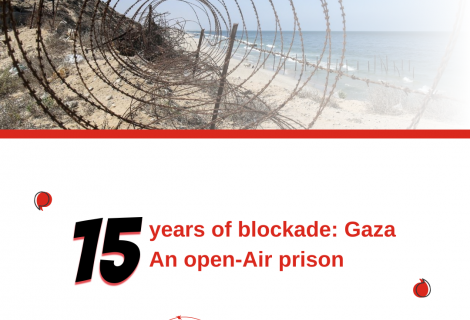Gaza Blockade: 15 Years of Living in a “Large Open Prison”

This month, the Palestinian people are marking the 15th anniversary of the illegal Israeli blockade of the Gaza Strip, which is imprisoning and isolating 2.1 million Palestinians from the rest of the world. In June 2007, the Israeli occupation imposed an airtight land, sea and air blockade on Gaza’s airspace and territorial waters, as well as two of the three border crossing points; the third is controlled by Egypt.
During the past 15 years, the blockade has turned the 362 square kilometer coastal enclave into an open-air prison. It is a form of unlawful collective punishment that keeps more than half (53%) the population in poverty, with young people in particular facing a staggering 75% unemployment rate. Food insecurity was affecting almost two-thirds (64%) of the population by the end of March 2022.
The consequences of the blockade have been felt by every single household in Gaza. Fishermen are confined within six nautical miles of the shore; farmers cannot access their land near the Israeli fence. Palestinians in Gaza are also experiencing a serious crisis regarding the lack of safe drinking water. According to UN reports, less than 4% of the water extracted from Gaza's underwater streams is drinkable. The Palestinians of Gaza are being denied their basic human rights, in a clear violation of Israel’s legal obligations under international law as an occupying power.
Amal, 39, is a mother of four living in the Gaza Strip. She has suffered from breast cancer since 2013 but was denied a permit for travelling abroad to receive medical treatment. She says, “I have tried to get a permit for medical treatment eight times in the West Bank and East Jerusalem, but all those attempts were refused. My physical and mental health have been deteriorating.”
The cancer has spread, and Amal is now unable to walk and needs to use a wheelchair to get around. She still hopes to be able to get a permit for travelling so she can receive medical treatment, despite the blockade and occupation. Amal keeps asking: “Where can I go to claim my right to treatment?”
Gaza has suffered four wars in the past 15 years. The most recent was in May 2021, during which over 260 Palestinians were killed and more than 2,000 were injured. Those left behind suffered irreversible damage to their assets and wellbeing. A Save the Children report recently found that “four out of five children in the Gaza Strip […] live with depression, grief and fear.”
Ibrahim Ibraigheth, Country Director of ActionAid Palestine, says:
“For one and a half decades, Palestinians in the Gaza strip have essentially been imprisoned. They cannot visit friends and family who live outside of Gaza, they don’t have enough food or clean water, and they can’t even get access to essential and lifesaving medical treatment. Unemployment is off the charts. The Israeli occupation urgently needs to end this blockade and allow Palestinians in Gaza to live their lives again.”
ActionAid calls on the international community to uphold its moral and legal obligations toward the Palestinian people by putting pressure on the Israeli occupation to lift its illegal blockade immediately and unconditionally, and end all associated unlawful restrictions imposed on the movement of people and goods to and from the Gaza Strip.
Further stories from residents of the Gaza Strip
Norhan Al-Mubashir,35, describes how the blockade impacts her life: “It has had negative effects, as it deprived me from enjoying my human rights and visiting Jerusalem and other areas in the West Bank and meeting with people. I cannot travel abroad to continue my education.”
Abed Al-Hakeem Awad,22, dreams of travelling outside Gaza Abed. Al-Hakeem says: “The blockade has deprived me of visiting our religious holy sites, including the Al-Aqsa Mosque, and has prevented me from travelling outside Gaza City.”
Mahmoud Al-Faqa’awi, 24, describes the Gaza Strip under blockade, saying: “The blockade has made Gaza lifeless with an unknown future, as if we were living in a large open prison”.
Marah Al-Satri-Gaza express her worries, saying: “I am very afraid of the future because of the increase in the unemployment rate in the Gaza Strip caused by the blockade by the Israeli occupation".
Background Information
ActionAid in Palestine (AAP) is a part of global federation working for social justice and gender equality and eradicate poverty in more than 46 countries around the world. AAP started its work in Palestine in 2007 to strengthen the resilience of Palestinian People as ActionAid believes that they should enjoy their rights to freedom, justice and self-determination. AAP implements a number of programs through its engagement with communities and women and youth groups seeking to empower them and enhance their influential civil and political participation to understand their rights and undertake collective activism to address the protracted rights violations resulting from the prolonged occupation of Palestine. AAP works simultaneously to enhance their leadership capacity and knowledge to practice their citizenship in holding authorities and other duty bearers to account.
For more information, please contact
Riham Jafari
Coordinator of Advocacy and Communication in Palestine
Mobile:
+972 (0) 595242890
Office:
+972 (0) (2) 22 13 137
Email: